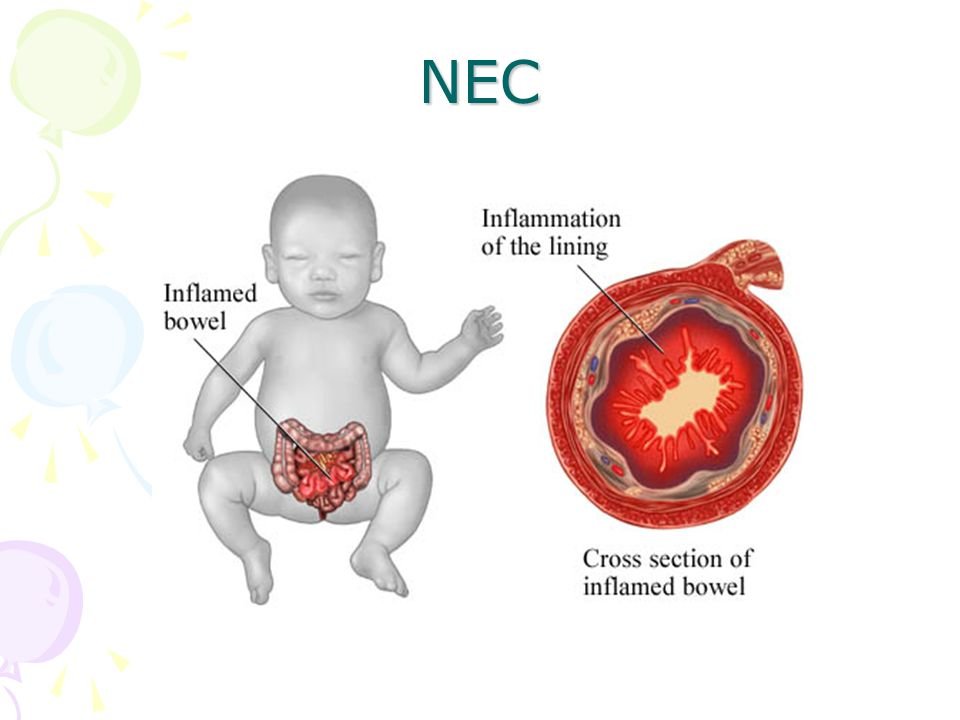Necrotizing enterocolitis (NEC) – This course is designed to understand the care of pregnant women and newborn: antenatal, intra-natal and postnatal; breast feeding, family planning, newborn care and ethical issues, The aim of the course is to acquire knowledge and develop competencies regarding midwifery, complicated labour and newborn care including family planning.

Necrotizing enterocolitis (NEC)
Necrotizing enterocolitis (NEC)
Necrotizing enterocolitis (NEC) is a severe inflammatory condition and damage of intestinal mucosa affecting small and large bowel of preterm infants due to ischemia resulting from asphyxia or prolonged hypoxia.
[Ref-Paediatric Nursing, Parul Datta/34/91]
Or
Necrotizing enterocolitis (NEC) is a disease that develops when the tissue in the inner lining of the small or large intestine becomes damaged and begins to die. This causes the intestine to become inflamed.
[Ref-www.healthline.com]
Etiologies of neonatal enterocolitis
The condition is encountered usually in low birth weight babies born before term. It may however, occasionally, develop even in normal full-term babies. Predisposing factors include-
1. Maternal fever.
2. Amnionitis.
3. Sepsis.
4. Respiratory distress syndrome (usually of mild type) exchange transfusion &
5. Oral feeding with high osmolar (hypertonic) stuff.
[Ref-Suraj Gupta/11/242]
Clinical features of neonatal enterocolitis
1. Stage I or suspected NEC: Neonates usually present with-
- Lethargy.
- Abdominal distension.
- Vomiting.
- Blood in stool.
- Instability of body temperature
- Bradycardia
- Apnea
- Cyanosis
- X-ray abdomen shows mild intestinal distension
2 . Stage II: In this stage, neonates present with features of stage I along with-
- Diminished bowel sound
- Metabolic acidosis
- Mild thrombocytopenia
- X-ray abdomen shows gas in the intestine (Pneumatosis intestinalis)
- Dilatation of intestine
3. Stage III: In this stage of NEC, neonates present with all features of stage I and II along with-
- Low blood Pressure
- Disseminated intravascular coagulation
- Anuria..
- Peritonitis.com
[Ref-Paediatric Nursing, Parul Datta/4th]
Management of neonatal enterocolitis baby
1. Warmth.
2. Fluid therapy for maintenance of fluid and electrolyte balance
3. Management of shock with fluid resuscitation and vasopressors.
4. No oral feeding.
5. Insertion of gastric tube to relieve abdominal distension and to aspirate gastric contents and continuous monitoring should be provided.
6. Parenteral nutrition to maintain nutritional requirement.
7. Plasma and platelets transfusion for bleeding.
8. Antibiotic therapy may be needed in some neonates.
9. Surgical intervention is required in case of intestinal perforation.
10. Surgery is done after initial stabilization of the sick neonate.
11. Supportive nursing care is important with need based individualized approach.
[Ref-Paediatric Nursing, Parul Datta/4th]
Or (Another answer)
Management
A. The initial course of treatment consists of the following:
Stop enteral feedings
Perform nasogastric decompression
Initiate broad-spectrum antibiotics (eg, ampicillin, gentamicin, and clindamycin or metronidazole)
B. Bell stages IA and IB- suspected disease
- NPO diet and antibiotics for 3 days
- IV fluids, including total parenteral nutrition (TPN)
C. Bell stages IIA and IIB – definite disease
- Support for respiratory and cardiovascular failure, including fluid resuscitation
- NPO diet and antibiotics for 14 days
- Consider surgical consultation
- After stabilization, provide TPN while the infant is NPO
D. Bell stage IIIA – advanced disease
- NPO for 14 days
- Fluid resuscitation
- Inotropic support
- Ventilator support
- Obtain surgical consultation
- Provide TPN during the period of NPO
- Surgical intervention
E. Surgery
The principal indication for operative intervention in NEC is perforated or necrotic intestine, which is most compellingly predicted by pneumoperitoneum. Other indications include the following:
- Erythema in the abdominal wall
- Gas in the portal vein
- Positive paracentesis
- Clinical deterioration
Preventive measures of neonatal enterocolitis in newborn

1. Reducing incidence of asphyxia.
2. Quick management of hypoxia.
3. Early initiation of feeding with breast milk.
4. Avoidance of formula feeding.
5. Meticulous infection control measures with continuous monitoring of preterm neonates.
[Ref-Paediatric Nursing, Parul Datta/4th]
